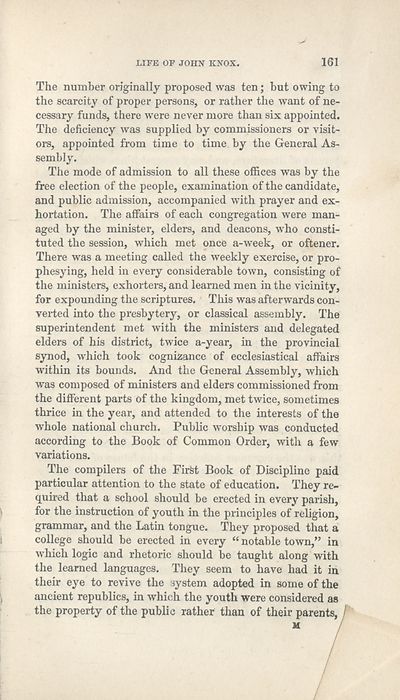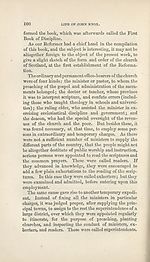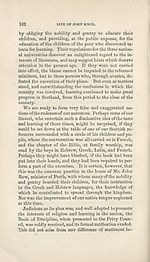Download files
Complete book:
Individual page:
Thumbnail gallery: Grid view | List view

LIFE OF JOHN KNOX.
161
The number originally proposed was ten; but owing to
the scarcity of proper persons, or rather the want of ne¬
cessary funds, there were never more than six appointed.
The deficiency was supplied by commissioners or visit¬
ors, appointed from time to time by the General As¬
sembly.
The mode of admission to all these offices was by the
free election of the people, examination of the candidate,
and public admission, accompanied with prayer and ex¬
hortation. The affairs of each congregation were man¬
aged by the minister, elders, and deacons, who consti¬
tuted the session, which met once a-week, or oftener.
There was a meeting called the weekly exercise, or pro¬
phesying, held in every considerable town, consisting of
the ministers, exhorters, and learned men in the vicinity,
for expounding the scriptures. This was afterwards con-
verted into the presbytery, or classical assembly. The
superintendent met with the ministers and delegated
elders of his district, twice a-year, in the provincial
synod, which took cognizance of ecclesiastical affairs
within its bounds. And the General Assembly, which
was composed of ministers and elders commissioned from
the different parts of the kingdom, met twice, sometimes
thrice in the year, and attended to the interests of the
whole national church. Public worship was conducted
according to the Book of Common Order, with a few
variations.
The compilers of the Firkt Book of Discipline paid
particular attention to the state of education. They re¬
quired that a school should be erected in every parish,
for the instruction of youth in the principles of religion,
grammar, and the Latin tongue. They proposed that a
college should be erected in every “ notable town,” in
which logic and rhetoric should be taught along with
the learned languages. They seem to have had it in
their eye to revive the system adopted in some of the
ancient republics, in which the youth were considered as
the property of the public rather than of their parents,
161
The number originally proposed was ten; but owing to
the scarcity of proper persons, or rather the want of ne¬
cessary funds, there were never more than six appointed.
The deficiency was supplied by commissioners or visit¬
ors, appointed from time to time by the General As¬
sembly.
The mode of admission to all these offices was by the
free election of the people, examination of the candidate,
and public admission, accompanied with prayer and ex¬
hortation. The affairs of each congregation were man¬
aged by the minister, elders, and deacons, who consti¬
tuted the session, which met once a-week, or oftener.
There was a meeting called the weekly exercise, or pro¬
phesying, held in every considerable town, consisting of
the ministers, exhorters, and learned men in the vicinity,
for expounding the scriptures. This was afterwards con-
verted into the presbytery, or classical assembly. The
superintendent met with the ministers and delegated
elders of his district, twice a-year, in the provincial
synod, which took cognizance of ecclesiastical affairs
within its bounds. And the General Assembly, which
was composed of ministers and elders commissioned from
the different parts of the kingdom, met twice, sometimes
thrice in the year, and attended to the interests of the
whole national church. Public worship was conducted
according to the Book of Common Order, with a few
variations.
The compilers of the Firkt Book of Discipline paid
particular attention to the state of education. They re¬
quired that a school should be erected in every parish,
for the instruction of youth in the principles of religion,
grammar, and the Latin tongue. They proposed that a
college should be erected in every “ notable town,” in
which logic and rhetoric should be taught along with
the learned languages. They seem to have had it in
their eye to revive the system adopted in some of the
ancient republics, in which the youth were considered as
the property of the public rather than of their parents,
Set display mode to:
![]() Universal Viewer |
Universal Viewer | ![]() Mirador |
Large image | Transcription
Mirador |
Large image | Transcription
| Antiquarian books of Scotland > Scotland/Scots > Life of John Knox ; and, The life of Alexander Henderson > (179) |
|---|
| Permanent URL | https://digital.nls.uk/131834452 |
|---|
| Description | Thousands of printed books from the Antiquarian Books of Scotland collection which dates from 1641 to the 1980s. The collection consists of 14,800 books which were published in Scotland or have a Scottish connection, e.g. through the author, printer or owner. Subjects covered include sport, education, diseases, adventure, occupations, Jacobites, politics and religion. Among the 29 languages represented are English, Gaelic, Italian, French, Russian and Swedish. |
|---|

